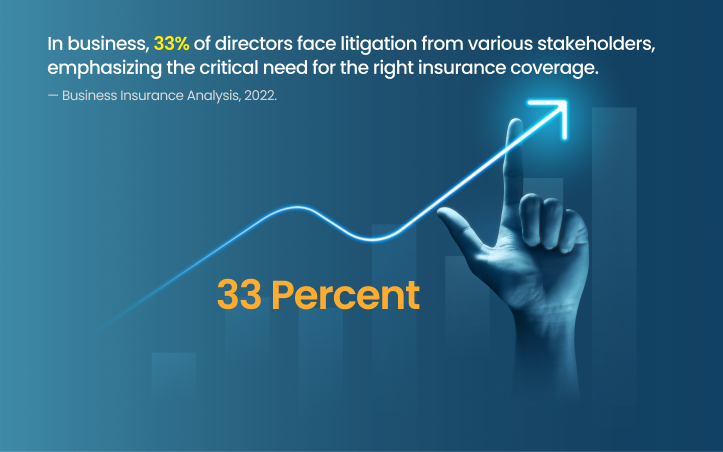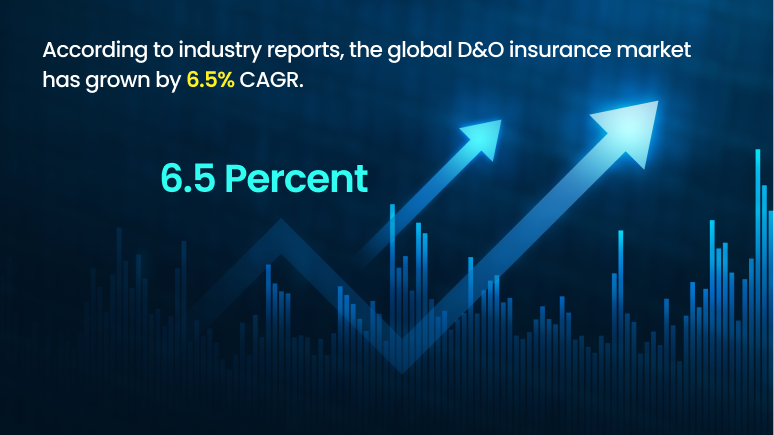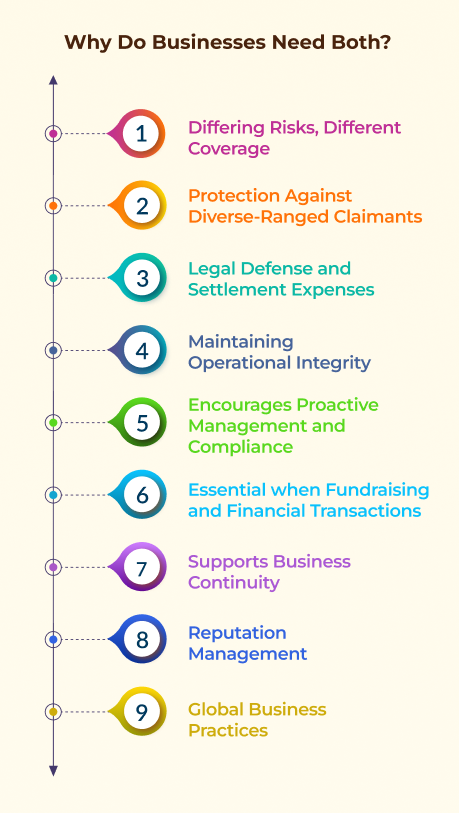“In business, 33% of directors face litigation from various stakeholders, Emphasising the critical need for the right insurance coverage.” — Business Insurance Analysis, 2022. Business insurance is highly complex and even more so when one tries to identify the difference between Professional Indemnity Insurance (PII) and Directors and Officers Insurance (D&O).
The two kinds of insurance types play a significant role in protecting professionals and executives from any loss that may result from the financial implications of litigation; however, they are applied to different purposes with the aim of furnishing coverage for other risks. Distinguishing their differences is essential to ensure your business and its leaders are adequately covered.

Professional Indemnity Insurance (PII)
Professional Indemnity Insurance, or Errors and Omissions (E&O) Insurance, protects professionals who provide professional advice or services from liability. This cover is necessary for consultants, architects, engineers, accountants, and other specialists who may face a legal claim of neglect or shortcomings in performing their professional duties.
For Example:
A software development firm is sued for failing to meet expectations for the client’s software, which results in loss for the client. The costs of legal fees and settlement under PII shall be covered, thus protecting the health of the company’s finances.
D&O: Directors and Officers Insurance
This insurance caters to management decisions within the organization. D&O insurance offers financial protection to a company’s directors and officers against claims arising from the decisions and actions they take as part of their regular duties. It covers a myriad of issues, including some concerning mismanagement and failure to conform to workplace regulations.
For Instance:
A director of a medium-sized enterprise is sued for misrepresenting the company’s financial standing to artificially increase the value of its shares. Under D&O insurance, their lawyers and any settlement to recover the director’s financial and professional well-being will be paid out.

Differences between PII and D&O Insurance
To make sure that we drive the point home, here is a comparison table of the differences between Professional Indemnity Insurance and Directors and Officers Insurance:
| Feature | Professional Indemnity Insurance | Directors and Officers Insurance |
| Purpose | Protects professionals against claims of negligence or malpractice in their services. | Protects corporate directors and officers from personal losses due to their management actions. |
| Primary Beneficiaries | Individual professionals or service-providing entities. | Board members, directors, and officers of a company. |
| Coverage Focus | Errors, omissions, negligence, and misrepresentation in professional advice or service. | Wrongful acts, mismanagement, misleading statements. |
| Typical Claimants | Clients or customers who have suffered a loss due to professional advice or services. | Shareholders, employees, regulators, creditors, and other stakeholders. |
| Common Claims | Professional negligence, breach of confidentiality, loss of data or documents, libel or slander. | Misuse of company funds, misrepresentation of company assets, failure to comply with workplace laws, lack of corporate governance. |
| Defense Costs | Generally covers legal defense costs, settlements, and court fees. | Covers legal defense costs, settlements, penalties, and sometimes punitive damages. |
| Policy Exclusions | Known liabilities before policy inception, intentional wrongdoing, criminal acts. | Claims related to fraudulent or criminal acts, known wrongful acts prior to policy inception, personal profiteering. |
| Additional Benefits | May include public relations crisis management, data breach response, and more. | Often includes protection for the company (entity coverage), employment practices liability, and outside board liability. |
| Regulatory Requirement | Not typically mandatory but highly recommended for professionals in certain sectors (e.g., medical, legal). | Not required by law but critical for publicly traded companies and often expected by investors. |
| Cost Factors | Based on the professional’s field, risk exposure, claims history, and policy limits. | Influenced by the company’s size, industry sector, operational jurisdiction, and financial condition. |
| Benefits to Policyholder | Protects against financial losses from litigation, ensuring professional reputation and operations can continue. | Safeguards personal assets of directors and officers, ensures leadership can make decisions without fear of personal financial loss. |
Importance of Both Insurances in Modern Business
The differences in PII and D&O insurance define the limits of coverage required in today’s highly complex business environment. An increasing number of organizations are now looking to protect their directors, officers, and other skilled employees from whatever legal and financial consequences may arise from their decisions.
According to industry reports, the global D&O insurance market has grown by 6.5% CAGR.

Comprehensive Coverage:
PII and D&O offer comprehensive coverage for most facets of business risk. PII safeguards liability arising out of professional activities, including the provision of services or giving advice, whereas D&O protects managerial decisions, thus providing an overall safety net.
Legal and Financial Protection:
Both insurances protect against actual legal actions and financial liabilities. PII can pay settlements and fees of lawyers for professional mistakes, while D&O can deal with the legal complexities that arise from corporate governance and decision-making.
Increased Credibility:
They provide a business with credibility in the form of clients, investors, and other stakeholders. This signals that the company is well-managed and may be ready to pose solutions to such risks.
Attracting Talent and Investment:
Businesses with excellent insurance policies will attract and retain the best talent and invest. The directors and officers will favor joining organizations that offer personal liability protection through D&O insurance.
Risk Management Strategy:
Adding PII and D&O as part of the overall strategy to mitigate risk would amount to effective risk management. In such a volatile business environment, this approach would help a company survive long enough to thrive.
Regulatory Compliance:
Certain industries strictly require companies to carry certain types of insurance cover. While it isn’t strictly necessary to carry PII and D&O, it means that the business is ready for potential regulatory expectations and cannot be penalized for not having it in place.
Stress Reduction for Managers:
As such, the existence of an insurance package against personal and professional risks assures managers and professionals that they can venture into practice without apprehension, thereby leading to better judgment and business practices.
Stability of the Market:
Eliminating the risk of financial ruin arising from litigation or claims protects the risks at a company level, ensuring the continuance of operations even under adverse conditions and, hence, the market’s stability.
Why Do Businesses Need Both?

More than one type of coverage would be required. As a tech startup stands with its PII, it may suffice in its early stages, but soon enough, it would realize the need for D&O to protect its officers from litigation because of their governance roles.
1. Differing Risks, Different Coverage:
PII covers professional errors, omissions, or negligence, while D&O insurance covers the management of the company’s decisions and actions. Thus, operations on one side and the executive levels will be covered principally.
2. Protection Against Diverse-Ranged Claimants:
PII mainly deals with claims that tend to come from clients or customers. D&O, however, deals with far more widely ranged claimants, such as shareholders, regulators, and even employees. This vast range is so important when the company interacts with many diverse groups whose expectations and grounds for claims differ.
3. Legal Defense and Settlement Expenses:
Both types of insurance cover potential enormous legal defense and settlement costs. These insurances are crucial for organizations so they will not go into financial ruin merely trying to defend themselves regardless of the result.
4. Maintaining Operational Integrity:
This preserves operational credibility, which may be critical for most service-oriented businesses. PII protects the company against alleged professional failures, while D&O insurance ensures that executives can lead without constant fear of personal financial risk from their decisions.
5. Encourages Proactive Management and Compliance:
D&O insurance encourages directors and officers to follow proper governance practices because they know they are covered. This benefits the entire company by cultivating a culture of compliance.
6. Essential when Fundraising and Financial Transactions:
Companies may find D&O insurance essential to being attractive to venture capital or any other form of investment. Investors want assurance that their interests are protected against failure or wrongful acts.
7. Supports Business Continuity:
It supports business continuity. Both insurances are critical in business continuity planning. They ensure that financial stability is achieved after a covered event, which enables companies to recover much faster. This will ensure that business operations can run uninterrupted with minimal disruptions.
8. Reputation Management:
Reputation management insurance would help minimize and control negative publicity in cases of litigation or claims. PII and D&O insurance may also cushion the cost of public relations expenses to ensure the company’s reputation is well-placed during times of crisis.
9. Global Business Practice:
More importantly, these insurances are valuable to businesses engaged in international activity because they operate in the milieu of foreign laws and regulation complexity. D&O insurance is essential for protecting and guarding executives exposed to additional risks in global markets.
Quick Read: How Professional Indemnity Insurance Shields Your Business?
Your Partner in Complete Business Protection

Professional Indemnity and Directors’ and Officers’ Insurance can be contrasted to highlight how they differ while assuming core positions in integral business risk management.
At Mitigata, we understand the specific risks professionals and their executives expose themselves to. Insurance solutions are tailored to ensure the preparation of your business in terms of taking up the complexities that modern risks present. Sit back, relax, and focus on what you do best: drive your business forward.
Ready to safeguard your business leaders and professional reputation? Contact Mitigata today for a consultancy or to get started with insurance solutions that will protect against the unforeseeable so that your business can thrive in any legal landscape.

